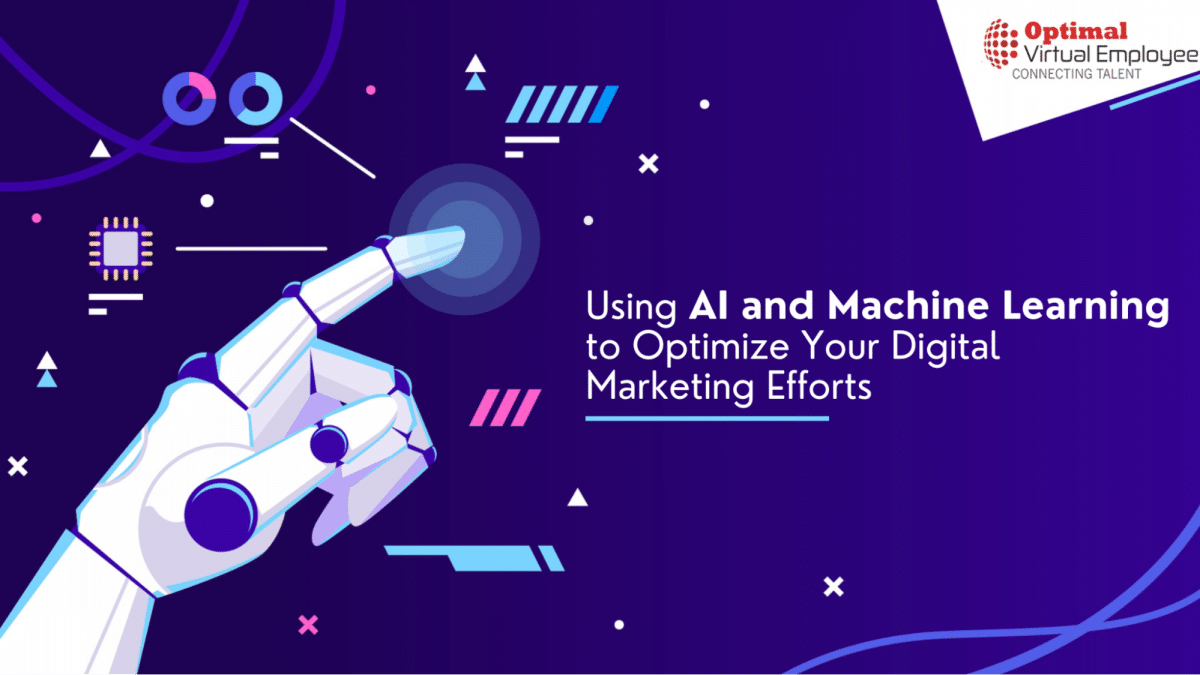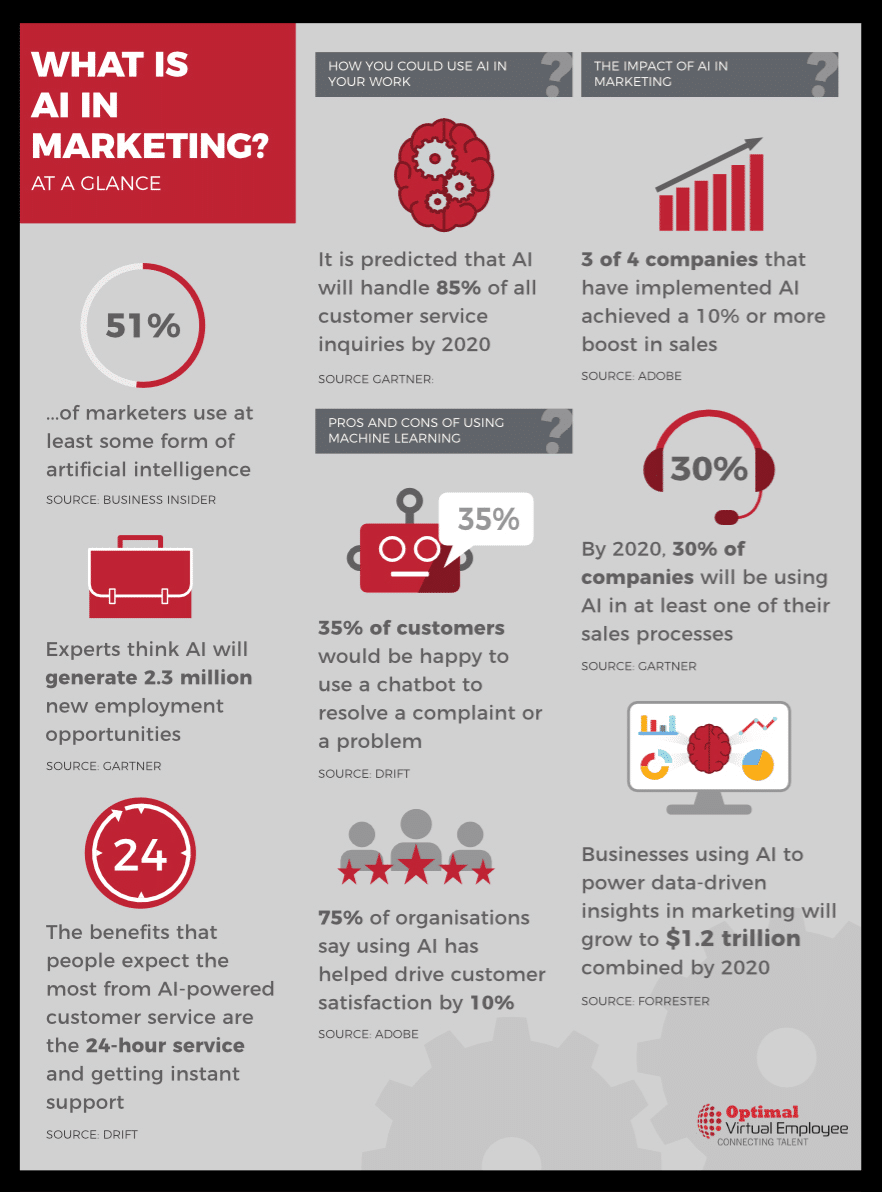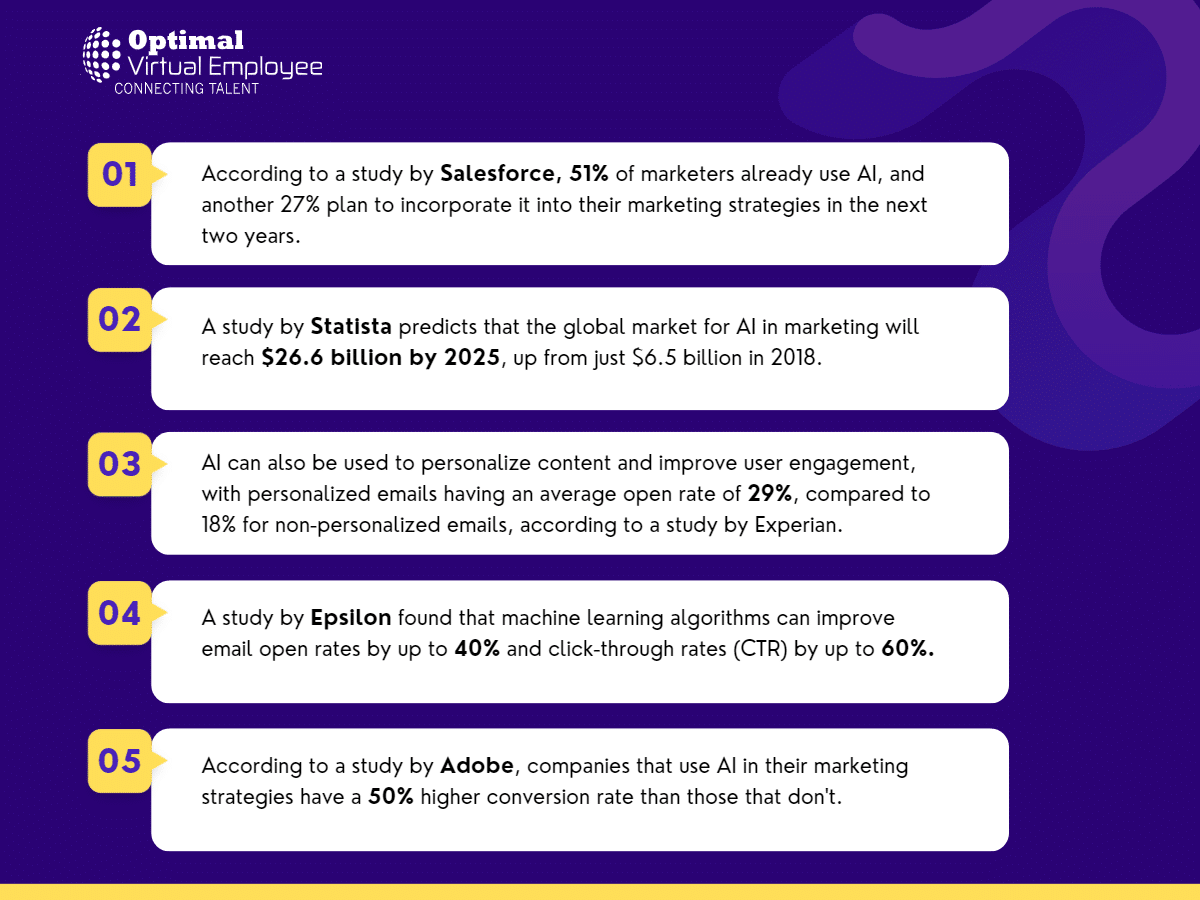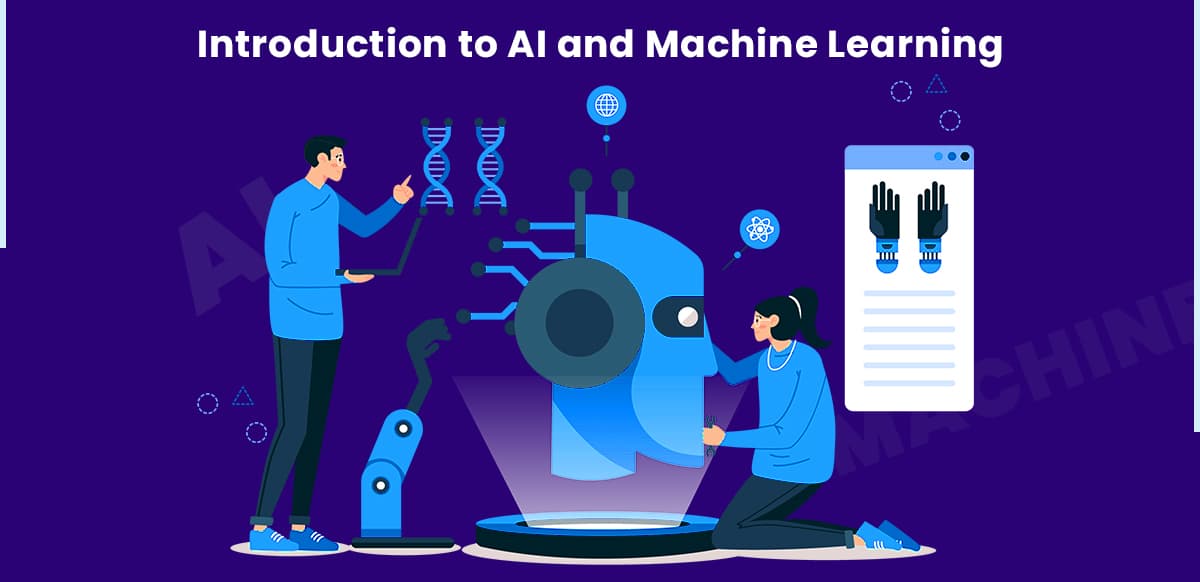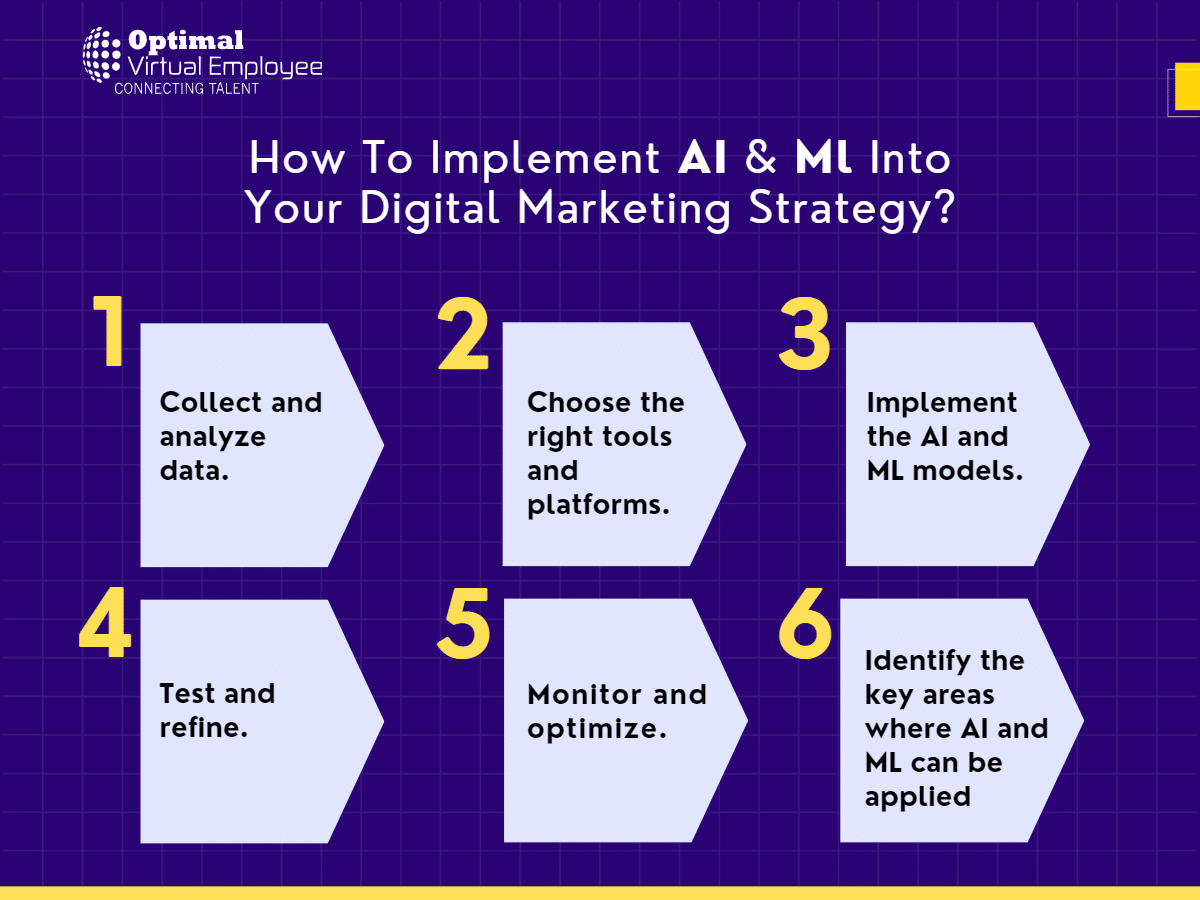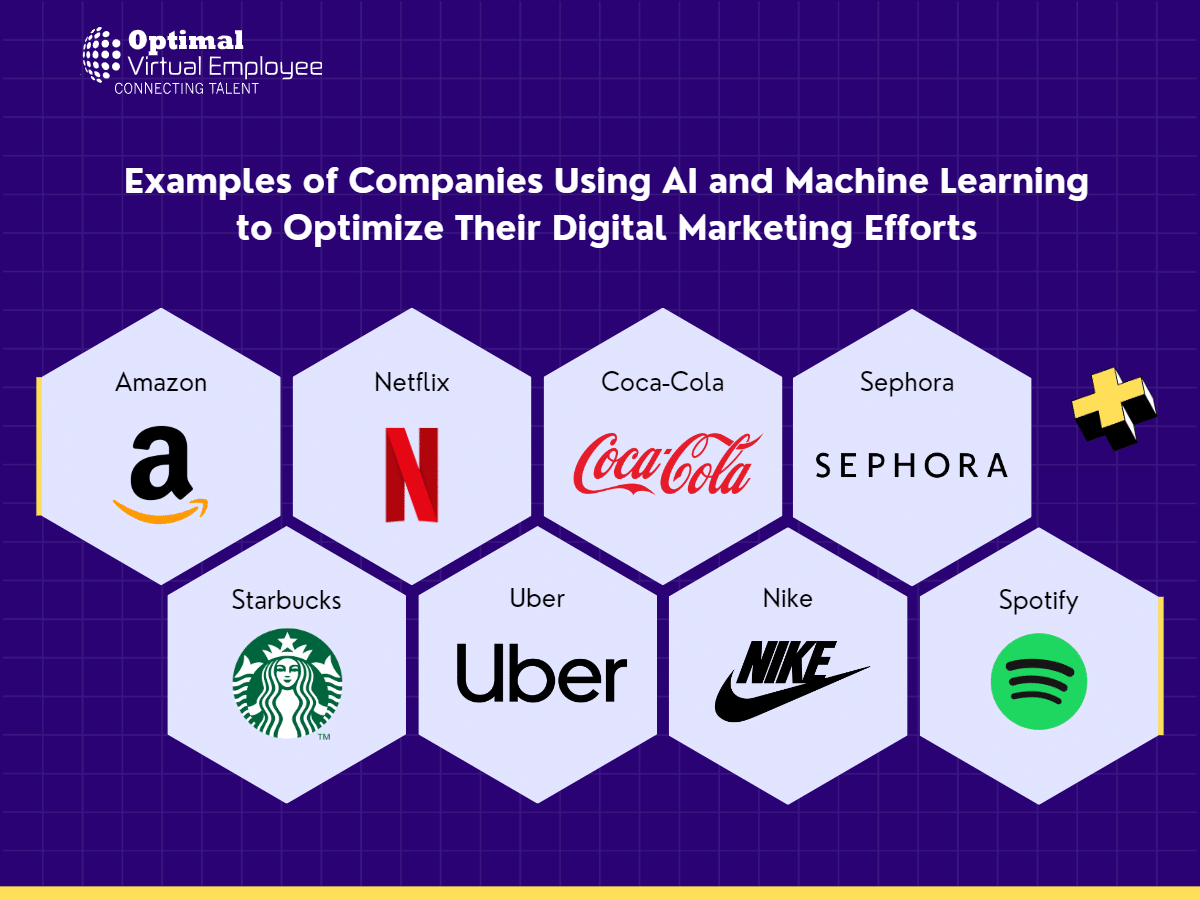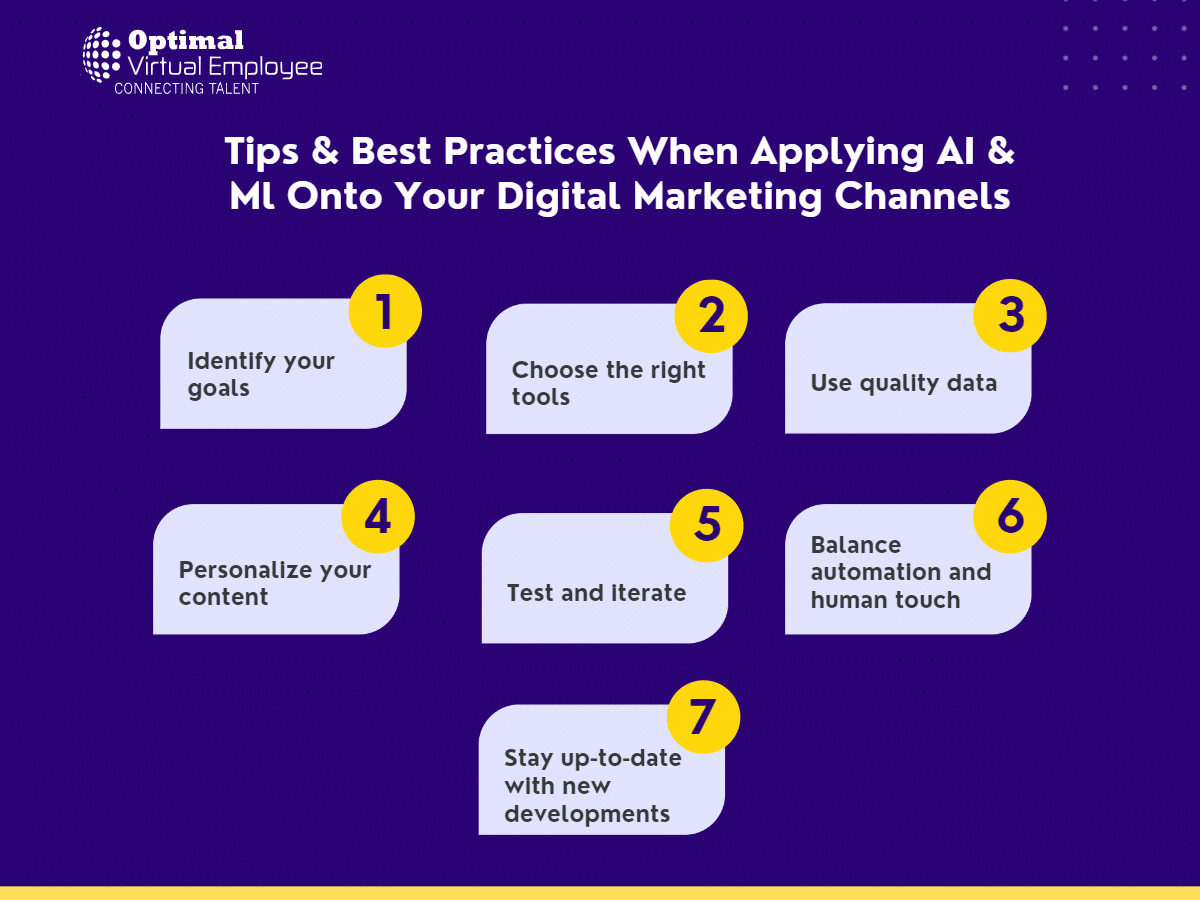In the era of digital dominance, where data reigns supreme, the success of your organization’s digital marketing efforts hinges on your ability to leverage advanced technologies to gain a competitive edge. As CXOs, you are tasked with driving growth, expanding market share, and maximizing ROI in an increasingly complex and rapidly evolving landscape.
To help you navigate this ever-changing terrain, we present our comprehensive guide: “Using AI and Machine Learning to Optimize Your Digital Marketing Efforts.”
AI and ML have become game changers in digital marketing, allowing marketers to understand their audience better, personalize their messaging, and optimize their campaigns for maximum impact.
With these technologies, businesses can identify key trends and patterns in their customer data and use those insights to craft targeted and effective marketing campaigns.
In this blog, we embark on a transformative journey into the realm of AI and machine learning, equipping you with the knowledge and strategies to harness these cutting-edge technologies and propel your digital marketing initiatives to new heights.
By leveraging the power of AI and machine learning, you can unlock valuable insights, make data-driven decisions, and optimize every aspect of your digital marketing campaigns for unparalleled success.
In fact, a study by Salesforce found that companies that use AI in their marketing efforts are 1.8 times more likely to achieve their marketing goals than those that don’t. Additionally, AI-powered email marketing campaigns have an open rate of 45.7%, compared to just 18.3% for non-AI campaigns.
Another area where AI and ML have had a significant impact is in the realm of programmatic advertising. In 2020, programmatic advertising accounted for over 85% of all digital advertising spending in the US, projected to reach $98 billion by 2023. By leveraging the power of AI and ML, businesses can automate buying and placing ads, optimize ad targeting and bidding, and ultimately achieve a higher return on investment (ROI) for their advertising dollars.
But AI and ML are not just limited to advertising and email marketing. These technologies can also be used to enhance social media marketing, search engine optimization (SEO), and even website design. By leveraging AI and ML, businesses can stay ahead of the curve and remain competitive in an ever-evolving digital landscape.
As we look to the future, it’s clear that AI and ML will continue to play a pivotal role in digital marketing. By embracing these technologies and leveraging their power to optimize their digital marketing efforts, businesses can drive growth, boost revenue, and build lasting customer relationships.
Introduction to AI and Machine Learning
Artificial Intelligence (AI) is a field of computer science that focuses on creating machines and algorithms that can perform tasks that would typically require human intelligence, such as perception, learning, problem-solving, and decision-making. Machine learning is a subset of AI that enables machines to learn from data and improve their performance over time without being explicitly programmed.
In machine learning, algorithms are trained on large amounts of data, and the models learn to recognize patterns and make predictions based on that data. There are three main types of machine learning: supervised learning, unsupervised learning, and reinforcement learning.
Supervised learning involves training a model on labeled data, meaning the data is already categorized or classified. The model learns from this data and can predict or classify new, unlabeled data.
Unsupervised learning, on the other hand, involves training a model on unlabeled data and having it discover patterns and relationships on its own. The model learns to group similar data together or identify anomalies.
Reinforcement learning involves training a model to make decisions in a specific environment or situation. The model receives feedback in the form of rewards or penalties based on its actions, and it adjusts its behavior to maximize its rewards over time.
AI and machine learning are used in various applications, from image and speech recognition to predictive analytics and natural language processing. As technology continues to advance, it has the potential to revolutionize industries and improve our lives in countless ways.
Benefits of AI and Machine Learning for Digital Marketing
Artificial Intelligence (AI) and Machine Learning (ML) are transforming the digital marketing industry. By using AI and ML, marketers can collect, analyze, and interpret vast amounts of data quickly, accurately, and efficiently. This technology gives marketers new insights into customer behavior and preferences, enabling them to make informed decisions about their marketing strategies. Let’s discuss the benefits of AI and ML for digital marketing in detail.
Personalization:
One of the primary benefits of AI and ML in digital marketing is personalization. AI algorithms can analyze vast amounts of data to identify customer preferences, behaviors, and interests. By using this data, marketers can create personalized content and offer tailored to each customer’s specific needs and preferences. This approach enhances the customer experience and builds long-lasting relationships with customers.
Improved Targeting:
AI and ML can help marketers identify and target the most promising leads with personalized messages. Marketers can use machine learning algorithms to analyze customer data and predict which customers will most likely convert. Marketers can improve their conversion rates and drive more revenue by targeting the right audience with personalized content and offers.
Real-time optimization:
AI and ML can help marketers optimize their marketing campaigns in real time. Marketers can adjust their marketing strategies quickly and effectively by using real-time data analysis. For example, if a marketing campaign is not performing well, AI algorithms can identify the problem and suggest changes to improve its effectiveness. This real-time optimization improves the efficiency of marketing campaigns and maximizes their ROI.
Chatbots and Customer Service:
AI-powered chatbots have become increasingly popular in recent years. Chatbots can provide customers with quick and accurate responses to their queries, 24/7. They can also guide customers through purchasing, reducing the likelihood of abandoned shopping carts. Using chatbots, marketers can provide exceptional customer service, improving customer satisfaction and loyalty.
Predictive Analytics:
AI and ML can help marketers predict customer behavior and preferences. By analyzing customer data, machine learning algorithms can predict which products or services customers are likely to purchase, which channels they prefer, and when they are most likely to purchase. Predictive analytics can help marketers make informed decisions about their marketing strategies, improving their effectiveness and efficiency.
Automated Marketing:
AI and ML can automate many marketing tasks, such as lead generation, email marketing, and social media marketing. Automated marketing reduces the time and resources required to execute marketing campaigns. Marketers can use AI-powered tools to create, launch, and monitor marketing campaigns automatically, freeing time to focus on other critical tasks.
AI and ML are transforming digital marketing by giving marketers new insights into customer behavior and preferences. AI and ML can help marketers personalize their marketing messages, target the most promising leads, optimize their marketing campaigns in real time, provide exceptional customer service, predict customer behavior, and automate marketing tasks. By using AI and ML, marketers can improve the efficiency and effectiveness of their marketing strategies, drive more revenue, and build long-lasting relationships with customers.
How To Implement AI & Ml Into Your Digital Marketing Strategy?
Implementing AI (Artificial Intelligence) and ML (Machine Learning) into your digital marketing strategy can be highly beneficial in terms of gaining insights, improving efficiency, and enhancing customer experiences. Here are some steps to follow for implementing AI and ML into your digital marketing strategy:
Identify the key areas where AI and ML can be applied: Some of the areas where AI and ML can be applied in digital marketing are customer segmentation, personalized marketing, predictive analysis, chatbots, and recommendation engines.
Collect and analyze data: To implement AI and ML, you must collect data on customer behavior, preferences, and interactions with your brand. This data should be analyzed to identify patterns and trends.
Choose the right tools and platforms: There are many AI and ML tools and platforms available in the market. You need to choose the right ones based on your requirements and budget.
Implement the AI and ML models: Once you have chosen the tools and platforms, you need to implement the AI and ML models in your digital marketing strategy. This may involve integrating the AI and ML models with your existing marketing tools and platforms.
Test and refine: Testing the AI and ML models to ensure they work effectively is important. You may need to refine the models based on the results.
Monitor and optimize: Once the AI and ML models are implemented, you must monitor and optimize their performance. This will ensure that you are getting the maximum benefit from your investment.
By implementing AI and ML into your digital marketing strategy, you can gain insights that will help you improve your customer experiences and increase conversions.
Examples of Companies Using AI and Machine Learning to Optimize Their Digital Marketing Efforts
Artificial intelligence (AI) and machine learning (ML) have become a game-changer for the digital marketing in recent years. Companies use AI and ML to optimize their digital marketing efforts, boost their sales, and increase their return on investment (ROI). Here are some examples of companies that are using AI and ML to optimize their digital marketing efforts:
Amazon
Amazon, one of the biggest online retailers in the world, uses AI and ML to personalize its marketing efforts. The company uses data on customers’ past purchases, browsing history, and demographics to recommend products that customers will likely be interested in. According to a report by Forbes, Amazon’s recommendation engine drives 35% of its sales.
Netflix
Netflix, the leading online streaming service, uses AI and ML to personalize its recommendations to its users. The company uses data on users’ viewing history, ratings, and other behaviors to recommend TV shows and movies they will likely enjoy. According to a report by VentureBeat, Netflix’s recommendation engine saves the company $1 billion annually in customer retention.
Coca-Cola
Coca-Cola, the world’s largest soft drink company, uses AI and ML to optimize its digital advertising campaigns. The company uses data on customers’ demographics, behaviors, and preferences to deliver personalized ads to its target audience. According to a report by IBM, Coca-Cola achieved a 30% increase in ROI using AI and ML to optimize its digital advertising.
Sephora
Sephora, a beauty retailer, uses AI and ML to personalize its marketing efforts. The company uses data on customers’ skin tone, type, and other preferences to recommend products that are tailored to their needs. According to a report by Salesforce, Sephora’s AI-powered chatbot drove an 11% increase in booking rates for its beauty services.
Starbucks
Starbucks, the world’s largest coffeehouse chain, uses AI and ML to personalize its marketing efforts. The company uses data on customers’ past purchases, location, and other preferences to recommend products they will likely enjoy. According to a report by Adobe, Starbucks’ personalized marketing efforts resulted in a 150% increase in click-through rates.
Overall, AI and ML are transforming the way companies approach digital marketing. Using data to personalize their marketing efforts, companies can increase their ROI, drive customer engagement, and ultimately boost their bottom line.
Tips & Best Practices When Applying AI & Ml Onto Your Digital Marketing Channels
Artificial Intelligence (AI) and Machine Learning (ML) are rapidly transforming the world of digital marketing, offering new opportunities for businesses to optimize their marketing efforts, improve customer experiences, and drive growth. AI and ML tools can help businesses personalize their marketing content, target the right customers, and improve their overall marketing performance. However, implementing AI and ML in digital marketing requires careful planning, strategy, and execution. Here are some tips and best practices to keep in mind when applying AI and ML to your marketing channels:
Identify your goals:
Determining your specific goals is the first step in applying AI and ML to your digital marketing channels. Are you looking to improve your targeting, increase conversion rates, or optimize ad spending? Understanding your goals will help you choose the right tools and approaches.
Choose the right tools:
There are many AI and ML tools available for digital marketing, from chatbots to predictive analytics. Research and evaluate different options to choose the best ones for your needs. Look for tools that integrate seamlessly with your existing marketing technology stack and offer the features and functionality you need to achieve your goals.
Use quality data:
AI and ML algorithms depend on data, so it’s essential to use high-quality data for optimal results. Make sure your data is clean, accurate, and relevant to the goals you want to achieve. Collect data from multiple sources, including customer interactions, social media, and website analytics, to comprehensively understand your customers and their behavior.
Personalize your content:
One of the most significant benefits of AI and ML in digital marketing is the ability to create personalized content that resonates with your audience. Use tools that analyze customer behavior and preferences to tailor your messaging and offers. Use dynamic content and personalization features to deliver customized messages to different segments of your audience.
Test and iterate:
Like any marketing strategy, AI and ML require testing and iteration to achieve the best results. Experiment with different approaches, use analytics to track performance, and adjust your strategy accordingly. Use A/B testing to compare different messaging, offers, and calls to action, and use machine learning algorithms to optimize your campaigns over time.
Balance automation and human touch:
While AI and ML can automate many marketing tasks, it’s important to maintain a human touch in your messaging and customer interactions. Find the right balance between automation and personalization to ensure your marketing efforts resonate with your audience. Use chatbots and other AI-powered tools to handle routine inquiries and customer support, but make sure to provide opportunities for customers to speak with human representatives when necessary.
Stay up-to-date with new developments:
AI and ML constantly evolve, so staying up-to-date with new tools and developments in the field is essential. Attend conferences, read industry publications, and network with other professionals to stay ahead of the curve. Keep an eye on emerging trends like natural language processing, computer vision, and predictive analytics to ensure you’re using the latest and most effective tools for your marketing efforts.
AI and ML can be incredibly valuable tools for optimizing digital marketing efforts. By following these tips and best practices, you can leverage AI and ML to create more personalized, effective, and engaging marketing experiences for your customers. By staying up-to-date with the latest developments in the field, you can stay ahead of the curve and continue to drive growth and success in your marketing efforts.
Conclusion
In conclusion, using AI and machine learning in digital marketing is a game-changer that cannot be ignored. As technology evolves, businesses that have not yet incorporated AI and machine learning into their marketing strategies will fall behind their competitors.
According to a report by Markets and Markets, the global AI in marketing market is expected to grow from $5.2 billion in 2019 to $40.3 billion in 2025, at a compound annual growth rate of 29.7%. This indicates that more and more businesses are realizing the importance of using AI in their marketing efforts.
Moreover, businesses that have implemented AI and machine learning into their digital marketing strategies have seen significant improvements in their results. According to a survey by BrightEdge, 51% of marketers report increased revenue due to AI and machine learning technology. Additionally, 61% of marketers using AI and machine learning in their campaigns report improved customer experiences, while 53% report improved campaign performance.
AI and machine learning also allows businesses to personalize their marketing efforts, which is essential in today’s market. According to a study by Epsilon, personalized emails have an open rate of 29% higher than non-personalized emails. This indicates that personalization is critical in engaging customers and building brand loyalty.
Moreover, AI and machine learning can help businesses optimize their advertising efforts. According to a report by Kenshoo, advertisers using AI and machine learning have seen a 30% improvement in return on ad spend (ROAS). Additionally, businesses that use AI and machine learning in their ad campaigns have seen a 53% increase in conversion rates.
In conclusion, using AI and machine learning in digital marketing is no longer an option but a necessity for businesses that want to remain competitive in today’s market. The technology allows businesses to personalize their marketing efforts, optimize their advertising campaigns, and improve customer experiences, leading to increased revenue and growth. With the expected growth of the AI in marketing market, it’s clear that businesses that don’t adopt AI and machine learning in their marketing efforts risk being left behind.
